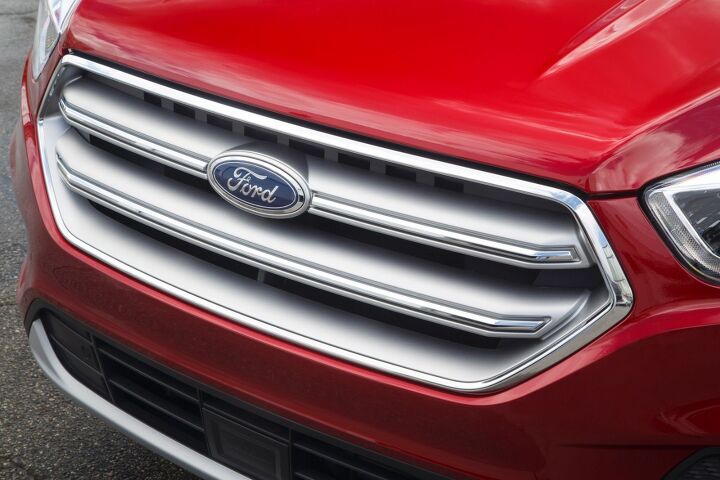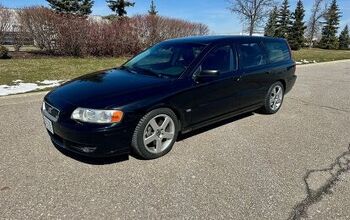Ford Launches Phase One of Its Restructuring Plan; Changes Target Money-losing European Arm

Ford Europe announced it had shuffled its leadership on Friday as part of a larger restructuring plan, appointing executives in Germany and the United Kingdom to oversee “ Sprint to 6 Reset and Redesign.” The strategy seeks to achieve a 6 percent EBIT (earnings before interest and taxes) margin, investing only in products and services that it believes best support long-term, sustainably and profitable business.
“Ford is implementing key leadership and organizational changes to improve the fitness and agility of its European operations as it undergoes a fundamental reset and redesign of its business,” the company said in an announcement that emphasized creating operational agility.
While the full scope of the plan has yet to be announced, layoffs and factory closings seem highly probable. Ford said announcements concerning the details of the restructuring are expected between now and the beginning of 2020. Europe is expected to be the primary focus during the initial months, however. Ford Europe lost nearly $250 million in the third quarter of 2018, significantly worse than it managed in 2017. The company now expects to see a net loss for the region this year.
Head of quality, Gunnar Herrmann, will front the restructuring process in Germany, while Graham Hoare will perform similar work in the United Kingdom. Hoare was previously responsible for Ford’s testing and development operations. Meanwhile, Kevin Reynolds, executive director for strategy, has elected to retire after more than 40 years with the company.
“Gunnar and Graham bring vast expertise to their new roles leading our reset and redesign plan in their respective countries,” Steve Armstrong, group vice president and president, Europe, Middle East and Africa, said in a statement. “Working closely with the rest of the European leadership team, they will play a key role in creating a long-term sustainably profitable business for the benefit of our customers, employees, partners and communities.”
Some of those employees are likely in for some harder times in the interim, though. Morgan Stanley previously suggested that the bulk of Ford’s $11 billion global restructuring plan will focus on Europe, leaving the region to endure the bulk of 25,000 global job losses it believes Ford has planned. Analyst Adam Jonas valued the automaker’s European businesses at “negative $7 billion.” While Ford was fast to refute Jonas’ claims, saying it had not provided Morgan Stanley with any pertinent information, it also did not say those claims were overblown — just that they were speculative.
“We forecast Ford Europe to post an accumulated loss of $3.6 billion from 2019 through 2021 with increased losses each year. By 2021, our forecast of Ford Europe’s Adjusted EBIT margin is negative 4.5% which we estimate would make Ford the least profitable [automaker] in that market,” Morgan Stanley said in an October report.
In July, Ford CFO Bob Shanks noted that most of Ford’s European vehicle range was unprofitable. By his estimation, the worst offenders were comprised “principally of cars and multi-activity vehicles such as C-Max.”
The company’s larger vans, utility vehicles, and the Mustang, however, are performing comparatively well. Most seem to believe that Ford will cull those unprofitable models from its European lineup while attempting to get more SUVs and crossovers to market. Ford has indicated this will likely be a core aspect of its restructuring plan.
[Image: Ford Motor Co.]

A staunch consumer advocate tracking industry trends and regulation. Before joining TTAC, Matt spent a decade working for marketing and research firms based in NYC. Clients included several of the world’s largest automakers, global tire brands, and aftermarket part suppliers. Dissatisfied with the corporate world and resentful of having to wear suits everyday, he pivoted to writing about cars. Since then, that man has become an ardent supporter of the right-to-repair movement, been interviewed on the auto industry by national radio broadcasts, driven more rental cars than anyone ever should, participated in amateur rallying events, and received the requisite minimum training as sanctioned by the SCCA. Handy with a wrench, Matt grew up surrounded by Detroit auto workers and managed to get a pizza delivery job before he was legally eligible. He later found himself driving box trucks through Manhattan, guaranteeing future sympathy for actual truckers. He continues to conduct research pertaining to the automotive sector as an independent contractor and has since moved back to his native Michigan, closer to where the cars are born. A contrarian, Matt claims to prefer understeer — stating that front and all-wheel drive vehicles cater best to his driving style.
More by Matt Posky
Latest Car Reviews
Read moreLatest Product Reviews
Read moreRecent Comments
- Brendan Duddy soon we'll see lawyers advertising big payout$ after getting injured by a 'rogue' vehicle
- Zerofoo @VoGhost - The earth is in a 12,000 year long warming cycle. Before that most of North America was covered by a glacier 2 miles thick in some places. Where did that glacier go? Industrial CO2 emissions didn't cause the melt. Climate change frauds have done a masterful job correlating .04% of our atmosphere with a 12,000 year warming trend and then blaming human industrial activity for something that long predates those human activities. Human caused climate change is a lie.
- Probert They already have hybrids, but these won't ever be them as they are built on the modular E-GMP skateboard.
- Justin You guys still looking for that sportbak? I just saw one on the Facebook marketplace in Arizona
- 28-Cars-Later I cannot remember what happens now, but there are whiteblocks in this period which develop a "tick" like sound which indicates they are toast (maybe head gasket?). Ten or so years ago I looked at an '03 or '04 S60 (I forget why) and I brought my Volvo indy along to tell me if it was worth my time - it ticked and that's when I learned this. This XC90 is probably worth about $300 as it sits, not kidding, and it will cost you conservatively $2500 for an engine swap (all the ones I see on car-part.com have north of 130K miles starting at $1,100 and that's not including freight to a shop, shop labor, other internals to do such as timing belt while engine out etc).


































Comments
Join the conversation
I'm thinking one way of reducing cost is through economies of scale. Sell some of your European cars like the focus Fiesta and Mondeo in other markets. The US for instance.
Reading other articles about a rumored VW-Ford tie up, I don't think this is only about the US. I think it's global. The Ford mothership in Dearborn has made it clear that it's not interested in spending anything on any sort of passenger car, especially anything in the B or C segment. Outside of North America, if you want to be a mass market brand, you really need to be in the B and C segments, but without US market volume, the amortization charge/unit for those products in Europe or China rises, and crimps profits. VW's Skoda division is desperately looking for more production capacity, where labor is cheap. Skoda is reported to be particularly interested in Romania or Turkey. Ford has plants in Romania and Turkey. The next gen Fabia, for instance, could be built in the Romanian Ford plant, along side a badge engineered Ford Fiesta version. Same thing in China, where Ford has been hammered lately. With all the products Ford doesn't want to get it's hands dirty with being contracted out to VW, Dearborn can concentrate on what it really wants to sell.